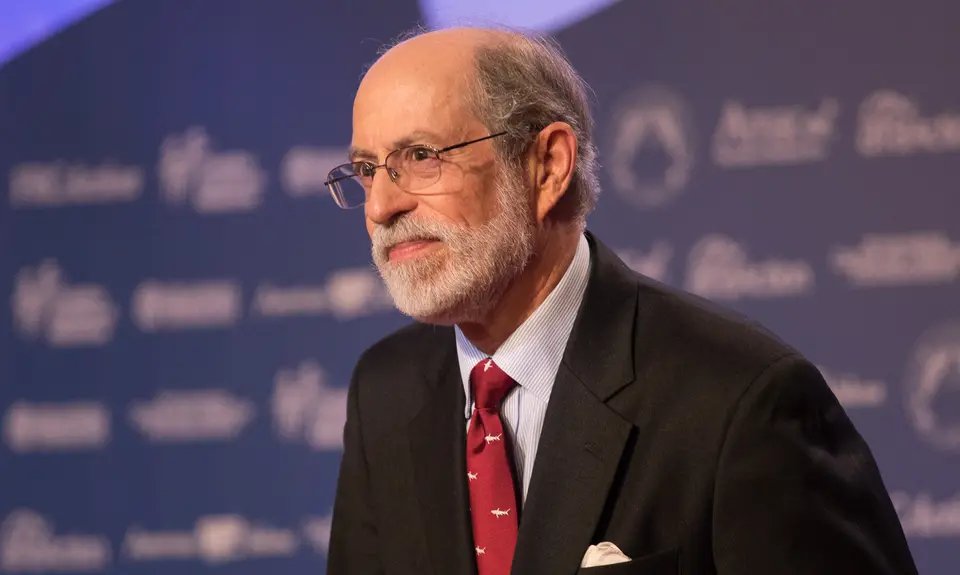Anti-Muslim activist and conspiracy theorist Frank Gaffney drew an on-stage rebuke from National Religious Broadcasters chair Janet Parshall during last week’s NRB Christian media convention after he used his time on stage to smear an upcoming panelist as an apologist for "Sharia supremacists," a term he has also applied to Muslim candidates for public office.
Gaffney’s extremism and obnoxiousness should not have come as a surprise to conference organizers. He was banned from the Conservative Political Action Conference for several years for making baseless charges that CPAC’s sponsor, the American Conservative Union, had been infiltrated by the Muslim Brotherhood. Back then, former ACU chairman David Keene publicly called Gaffney a “conspiracy nut” who “has managed to convince himself that anyone with whom he disagrees is not just wrong but an agent of one conspiracy or another.”
But in the Trump era, anti-Muslim extremism is apparently back to being acceptable in the conservative movement and Gaffney has been welcomed back into the CPAC fold since 2016—with foreign policy hawk John Bolton reportedly playing a “crucial role” in Gaffney’s rehabilitation.
It remains to be seen whether Gaffney will be invited back to the NRB convention. Here’s what happened.
Gaffney has created a new group called Save the Persecuted Christians, and that group sponsored the NRB session at which Attorney General William Barr spoke, followed by a panel conversation on religious liberty issues. The panel included Asma Uddin, a Muslim lawyer and Aspen Institute fellow who used to work for Becket, a conservative legal organization focused on religious liberty cases.
Gaffney’s group’s sponsorship of the session apparently bought him the right to make a short presentation. Just before Barr’s appearance, Gaffney praised Barr and described the persecution of Christians around the world as “the most extraordinary and horrific crime against humanity in the history of mankind.”
Then he said he wanted to “clarify” something:
We had sponsored the attorney general. We sponsored Christians. We have not sponsored, despite what it says in your published program, the next program.
And that is because we do not support as an organization those who I think are best described as Sharia supremacists, who are responsible for persecution of approximately 80 percent of those Christians who are being now terribly oppressed around the world. We don't sponsor or support those who engage in that behavior, of course. We don't support or sponsor those who enable it.
In fact, we believe in holding accountable those who are engaged in persecution is our unique mission and trying to prevent them from doing more of it by creating costs to them for engaging in persecution—a systemic approach, if you will, to this form of anti -Christian persecution.
We do not support Sharia supremacists themselves or their enablers or their apologists.
And it pains me beyond words that this program that will be coming up after the attorney general’s remarks, you have such an individual who will be presented to you, I'm afraid, as someone who is a perfect example of moderate Muslims and a perfect interlocutor for us in interfaith dialogue and bridge building and the like.
I regret to say that Asma Uddin has attacked me personally for opposing Sharia supremacism. She may do it yet again on this stage. I simply want to leave you with this important message: I have not sponsored, my organization has not sponsored, this program. And I hope that you will not be misled into believing that this individual—I've nothing against her personally—but this individual and what she stands for and most especially what she is doing with organizations like the Council on American Islamic Relations—one of the most aggressive Muslim Brotherhood front organizations in the country—must not be endorsed, even if it's implicitly, by this organization.
I had hoped that she would not be given a platform. She is. I trust you listen attentively. But I hope that you will not give her yourselves a platform.
At that point, music began to play, Academy Awards-style, and Gaffney closed with, “Thank you for hearing me out. God bless you all.”
Craig Parshall followed Gaffney to the microphone and, with Attorney General Barr at his side, said “Thank you, Frank, for your honest comments,” adding, “And let me say that we believe in the full, unfettered freedom of speech and freedom of religion of every sincerely held religious belief, because without it, the gospel of Christ would end up being disadvantaged.”
Janet Parshall moderated the panel that followed Barr’s speech and she began by addressing Gaffney’s “ill-timed, inappropriate, and hurtful” comments about Uddin. She quoted author C.S. Lewis as saying that “Christians are the best argument for and against Christianity.”
Parshall apologized to Uddin and told the audience that Uddin had worked for Becket, which she called “one of the most prominent religious liberty organizations in the country—while General Barr served on their board of directors,” adding, “No problem there.”
Toward the end of the panelists’ conversation, author Steven Waldman also took a moment to criticize Gaffney. Waldman said Christians do face threats and challenges to their religious liberty, but that “at exactly the moment that Christians need to be respected and heard on this, they have forfeited their credibility in many cases by attacking Muslims.”
“Frank Gaffney was exhibit A,” Waldman continued, citing some of the extreme positions he said Gaffney has staked out, including the assertion that Islam is not a religion and Muslims should not be protected by the First Amendment. “It is an extreme view,” Waldman said.
It is true that Gaffney’s anti-Muslim positions are extreme, but it is also true that other prominent proponents of similar extremism—including the Family Research Council’s Jerry Boykin, the American Family Association’s Bryan Fischer, and ACT for America’s Brigitte Gabriel—are welcomed and celebrated by other religious-right and right-wing movement leaders.





